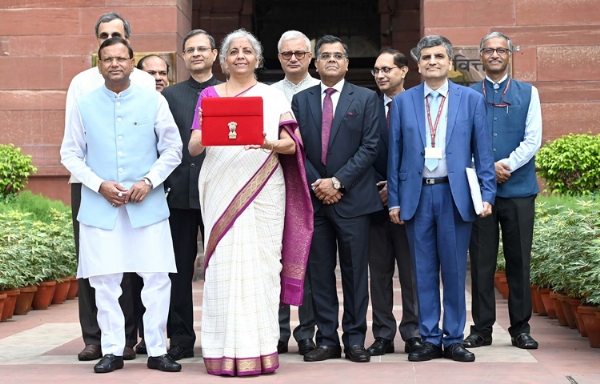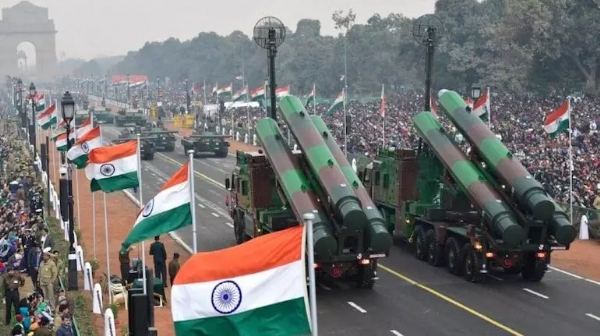Budget 2024: A Comprehensive Blueprint for Reforms | Substancial allotment For Defence Ministry & Internal Security
26 Jul 2024 16:27:18
A Strategic Approach for National Growth
The Budget 2024 marks a strategic milestone for the Indian government, emphasizing a balanced approach towards fiscal discipline, capital expenditure, regulatory simplification, job creation, and forward-thinking reforms. This holistic strategy aims to drive robust economic growth and foster increased employment opportunities across the nation.

Budgets have historically been platforms for grand announcements and symbolic gestures, they have become an integral part of the budget's narrative and tradition.
Fiscal Discipline and Strategic Investments: Building a Strong Financial Foundation
This year's budget reaffirms the government's commitment to fiscal discipline, exemplified by a reduced fiscal deficit target and a clear roadmap for future reductions. With a substantial allocation towards capital expenditure, the government aims to leverage infrastructure development's multiplier effect to propel economic growth and development.
Simplification and Clarity: Enhancing Governance and Business Environment
The budget places significant emphasis on simplifying rules, statutes, and policies to reduce complexity, minimize disputes, and enhance the ease of doing business. By streamlining regulations and tax structures, the government aims to foster a competitive market environment and promote inclusive growth.
Empowering Job Creation: Prioritizing Sustainable Employment
Recognizing the importance of sustainable job creation, the budget introduces targeted initiatives to incentivize employment across various sectors. From direct benefit transfers for first-time employees to support for women's workforce participation and skilling programs, the budget prioritizes generating high-quality employment opportunities.
Next-Generation Reforms: Pioneering Economic Enhancements
Looking towards the future, Budget 2024 sets the stage for next-generation reforms geared towards stimulating high growth and employment. By focusing on enhancing productivity across key sectors like land, labour, capital, entrepreneurship, and technology, the budget outlines a comprehensive strategy to drive economic progress and innovation.
Sustainable Infrastructure Development:
The substantial allocation towards capital expenditure in Budget 2024 underscores the government's focus on sustainable infrastructure development. This investment is not only aimed at immediate economic stimulus but also at fostering long-term growth through enhanced connectivity, , in key states.
Regulatory Reforms and Business Environment:
The budget's emphasis on simplifying rules, statutes, and policies is expected to have a ripple effect on the overall business environment. By reducing complexity, streamlining regulations, and rationalizing tax structures, the government aims to enhance ease of doing business, attract investments, and spur entrepreneurial activity.
Employment Generation and Skilling:
Beyond the headline initiatives like the "Employment Linked Incentive" scheme, Budget 2024 also prioritizes women's workforce participation, skilling programs, and educational loans to support skill development and higher education. These measures are crucial for nurturing a skilled workforce and promoting inclusive growth.
Green Transition and Financial Sector Reforms:
Notable provisions in the budget include the development of a taxonomy for climate finance to support green initiatives and the introduction of a Variable Capital Company structure to facilitate flexible financing mechanisms. These reforms are aligned with global trends towards sustainable development and aim to enhance the financial sector's capabilities.
Forward-Thinking Economic Enhancements:
The budget's focus on next-generation reforms highlights the government's commitment to leveraging technology, enhancing land administration, and optimizing labor market matching. By addressing key areas such as land digitization, labor integration, and financial sector modernization, Budget 2024 sets the stage for future-proof economic growth.
Jan Vishvas Bill 2.0:
The proposed enactment of the Jan Vishvas Bill 2.0 signals the government's continued efforts to promote ease of business and living in India. This legislative initiative is expected to further streamline regulatory processes, enhance governance efficiency, and create a more conducive environment for businesses and individuals alike.
Defence Ministry Boosts Budget to Enhance National Security

The Defence Ministry has fortified its financial arsenal with a substantial ₹1.72 lakh crore allocation aimed at procuring cutting-edge weapon systems. This forms part of the ministry's broader ₹6.22 lakh crore budget, slightly surpassing the earlier interim budget allocation. There has been substantial allocation which accounts for 12.9 per cent of the total budget.
A substantial portion of this financial blueprint is earmarked for pensions and salaries, underscoring a commitment to both modernization and personnel welfare.
Strengthening Defence Capabilities through Strategic Investments
The capital acquisition outlay is strategically earmarked for acquiring a spectrum of new weapon systems vital for bolstering the armed forces. From fighter aircraft to ships, submarines, drones, and specialized vehicles, this allocation is pivotal for enhancing operational readiness. Noteworthy plans include the modernization of the Su 30MKI fighter fleet, additional aircraft procurement, engines for the MiG-29 fleet, and acquiring transport aircraft like the C-295 and LCA Mk1A fighter.
Strategic Procurements on the Horizon
Anticipated major procurements this year encompass diverse agreements, including acquiring additional submarines from Mazagaon Dockyards Ltd, purchasing 26 Rafale Marines from France, and securing long-range drones from the US. These strategic acquisitions signify a concerted effort to reinforce our national security apparatus.
A Boost to Flagship Schemes and Innovation
Significant hikes in allocations toward flagship schemes like the Agnipath initiative highlight a commitment to bolstering defense capabilities. Moreover, an additional ₹400 crore has been allocated for fostering innovation in defense through the Acing Development of Innovative Technologies with iDEX (ADITI) scheme, aimed at incentivizing innovative solutions within the defense sector.
Emphasizing Border Infrastructure Development
A key focus lies on enhancing border infrastructure, with a notable 30% boost in the Border Roads Organisation's budgetary allocation. Projects such as the development of Nyoma airfield in Ladakh, the Shinku La tunnel in Himachal Pradesh, and the Nechiphu tunnel in Arunachal Pradesh are slated to receive funding from this allocation. This strategic emphasis underscores a holistic approach to fortifying our border defenses.
Capital outlay will fortify the armed forces' capabilities while also catalyzing broader economic benefits. This robust financial commitment not only enhances our national security posture but also signals a proactive stance towards innovation and infrastructure development within the defense sector
Budget 2024 allocates Rs 2.19 lakh crore for India's internal security, intelligence
The Ministry of Home Affairs has received an allocation worth Rs 2.1 lakh crore from the Union Budget 2024. A majority of this fund has been given to central security forces like CRPF, BSF and CISF that are responsible for internal security.
Adequate Allotment Central Armed Police Forces
Central Reserve Police Force (CRPF): Rs 31,543.20 crore
Border Security Force (BSF): Rs 25,472.44 crore
Central Industrial Security Force (CISF): Rs 14,331.89 crore
Indo-Tibetan Border Police (ITBP): Rs 8,634.21 crore
SSB: Rs 8,881.81 crore
Assam Rifles: Rs 7,428.33 crore
Intelligence Bureau (IB): Rs 3,823.83 crore
Delhi Police: Rs 11,180.33 crore
Special Protection Group (SPG): Rs 506.32 crore
Police infra, developmental schemes
Meanwhile, Rs 3,756.51 crore has been allocated to the Border Infrastructure and Management, Rs 3,152.36 crore has been given for developing police infrastructure, Rs 1,105 crore for schemes related to women’s safety, Rs 9,305.43 crore for various central sector projects and schemes sponsored by the home ministry, Rs 3,199.62 crore for security-related expenditure and Rs 1,050 crore for Vibrant Villages Programme.
The Safe City Project has been allotted Rs 214.44 crore, the National Forensic Science University got Rs 80 crore and the Rashtriya Raksha University has been given Rs 90 crore.
The budget also allocated Rs 1,309.46 crore (Rs 578.29 crore in 2023-24) towards work related to census and Rs 1,606.95 crore to the National Disaster Response Force (Rs 1,666.38 crore in 2023-24)
These aspects collectively depict Budget 2024 as a comprehensive and forward-looking financial plan that not only addresses immediate economic challenges but also lays the groundwork for sustainable growth and development in India.
In conclusion, Budget 2024 emerges as a well-rounded financial plan, striking a balance between fiscal prudence, strategic investments, regulatory simplification, job creation, and futuristic reforms. With its multi-dimensional approach, the budget paves the way for sustained economic growth and enhanced employment opportunities in India.
--